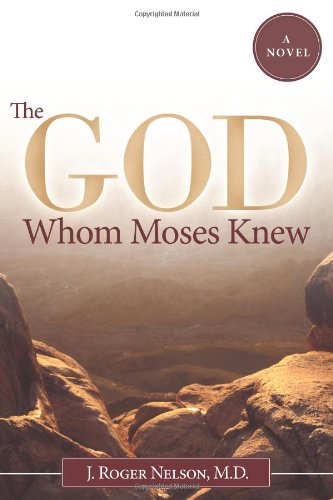Book review: The God Whom Moses Knew
by J. Roger Nelson, M.D.
★★★
Roger tells the story of Moses, leaning heavily on the Biblical version, and does so pretty straight-forwardly. Moses grows up in an Egyptian palace, learns about his Hebrew roots, kills an Egyptian taskmaster, flees into the desert for forty years, sees a burning bush, returns to Egypt at God’s command to lead the Israelites out of bondage. All by the book.
Everyone knows the story of the plagues of Egypt. Frogs and locusts and bloody rivers and stuff. They’re as destructive in Roger’s version as they are in the Bible. In fact, as the plagues roll on and Pharaoh won’t buckle, Moses begins to feel sorry for Egypt. He tries to convert Pharaoh away from Egyptian gods to the God of Abraham, hoping to stave off further suffering. Failing this, Moses trudges through Egyptian lands warning people of the next plague, a murderous hailstorm, and begging them to stay indoors.
Eventually, Moses leads Israel out into the desert, where the people turn cranky, and God loses patience. The story’s theme of God-ordained suffering continues. When Israel at Baal Peor begins to worship the wrong god, the God of Abraham tells them to kill all their wayward brethren. Moses watches his brethen slaughter twenty four thousand of their own.
As they reach the promised land, God instructs Israel to murder everything that moves. “You shall not leave alive anything that breathes.” Moses weeps for Canaan’s inhabitants, and makes up some unconvincing excuses for God’s behavior. There was no alternative to God’s ruthlessness, he decides. Israel must kill the males because if they don’t, the enemy armies will be an ever-present threat. If Israel hadn’t proven themselves untrustworthy, God would probably not require this. They must kill the females because the women deserve it. These women enticed Israel’s men with their feminine wiles. They must kill all the cows because … well, I guess Moses doesn’t have an excuse for this one.
All this is relayed in a matter-of-fact tone. God speaks directly to Moses, so we are given no reason to believe all this pain isn’t sanctioned by the Big Guy, Himself. Near the end of the story, as Moses is about the die, Joshua, his successor, asks him a question: “Moses, how can we convince others that God is not a cruel tyrant, but a wise, forgiving, and indeed a feeling God?” Moses in essence tells Joshua he’ll have to figure that one out on his own. Okay, this is fine so far, but suddenly the book threw me for a loop. As it settled to a close, Roger felt compelled to include an evangelical pitch. God desires all to come to him. “Are you choosing not to believe, to be left behind in Egypt?” Uh, Roger, did you read your own book? Is God a jealous, genocidal murderer or is he not? Can you at least give some hint that all this inhumanity wasn’t really God’s doing, before asking us to follow him?












 354 Circles
354 Circles
 603 Goodreads Friends & Fans
603 Goodreads Friends & Fans

 Hello! I'm an author, historical Jesus scholar, book reviewer, and liberal Christian, which means I appreciate and attempt to exercise the humanitarian teachings of Jesus without getting hung up on any particular supernatural or religious beliefs.
The Bible is a magnificent book that has inspired and spiritually fed generations for thousands of years, and each new century seems to bring a deeper understanding of life’s purpose. This is true of not only Christianity; through the years, our age-old religions are slowly transforming from superstitious rituals into humanitarian philosophies. In short, we are growing up, and I am thrilled to be riding the wave.
I avidly read all thought-provoking religion titles. New authors: I'd love to read and review your book!
Hello! I'm an author, historical Jesus scholar, book reviewer, and liberal Christian, which means I appreciate and attempt to exercise the humanitarian teachings of Jesus without getting hung up on any particular supernatural or religious beliefs.
The Bible is a magnificent book that has inspired and spiritually fed generations for thousands of years, and each new century seems to bring a deeper understanding of life’s purpose. This is true of not only Christianity; through the years, our age-old religions are slowly transforming from superstitious rituals into humanitarian philosophies. In short, we are growing up, and I am thrilled to be riding the wave.
I avidly read all thought-provoking religion titles. New authors: I'd love to read and review your book!
 Hi! While Lee writes the articles and reviews the books, I edit, organize, and maintain the blog. The views expressed here are Lee's but I'm his biggest supporter! :-)
Hi! While Lee writes the articles and reviews the books, I edit, organize, and maintain the blog. The views expressed here are Lee's but I'm his biggest supporter! :-)
This comment has been removed by a blog administrator.
This comment has been removed by a blog administrator.